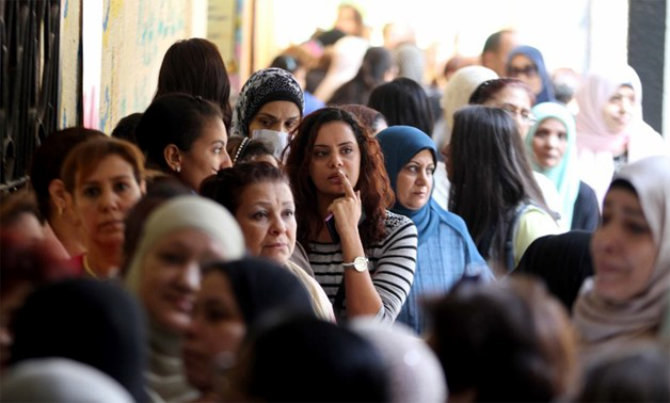Arab women must be given a voice

https://arab.news/jymcw
March is the month of the woman, when we ought to, among other things, celebrate the great strides made in elevating and empowering this historically marginalized demographic. Across the Arab world, however, the status of women and girls is still worrisome.
The exclusion or sidelining of women’s voices, expertise and unique experiences leaves Arab societies susceptible to prolonged upheavals fueled by crises from abroad, ultimately undermining efforts to make them resilient. Public squares, legislatures and policy-setting circles remain dominated by men, even on issues that have universal impacts, while in some cases, women’s participation or leadership is welcomed only when it is relegated to disempowering initiatives.
It is no wonder the Arab region ranks second-lowest in the World Economic Forum’s Global Gender Gap Index, just ahead of South Asia. The region scores poorly on indicators like health, education and participation, resulting in a gender gap that could take some 115 years to close, with just seven years remaining until 2030 to achieve the UN’s Sustainable Development Goals.
On paper, most constitutions promise equality or rights for all, but the contradictory laws and policy loopholes that follow, as well as stereotypes, antiquated belief systems or a lack of accountability, end up perpetuating further the discrimination against and marginalization of women. While Arab societies have managed some gains toward achieving parity, these often come at a very hefty price. It does not take long for relative progress to quickly give way to a disappointing regression into the familiar silencing of women.
Worse still, even the mass movements that claim to have solutions for these imbalances and other inequities end up merely co-opting women’s struggles in order to swell the ranks. Overall, they are not women-friendly. It is unsurprising, therefore, that women and girls are consistently one of the greatest casualties of the Arab region’s myriad crises, especially those languishing in poverty. This year will be one of the most challenging, likely exacting a record toll on this vulnerable demographic in a region hobbled by the ramifications of a devastating pandemic, climate change, conflict, chronic instability and worsening food and water insecurity.
March may be the month of the woman, but it is also a grim reminder of how much more there is left to do to empower them.
It will take a lot of effort to raise the urgency of elevating women in this part of the world. Established cultural norms created the existing structures and unbalanced power relationships in Arab societies that disadvantage women, impeding their capacity to adapt to the crisis-laden realities of today. Over time, this extreme exclusion contributes to diminished decision-making, leading to less and less engagement in formulating policies or crafting interventions, even when addressing issues that directly impact women.
March may be the month of the woman, but it is also a grim reminder of how much more there is left to do to empower them.
Hafed Al-Ghwell
The costs of integrating women fully into the economy are astronomical and will only get higher. Despite some investment in closing gender gaps and improving access to opportunities, nearly 80 percent of women across the Arab world are still not participating in the labor force. As a result, the region’s economies are bleeding an estimated $600 billion every year — a self-inflicted loss that is larger than the combined gross domestic product of the five Maghreb countries — making it impossible to eradicate poverty or improve living standards.
The 2020 pandemic and the responses to it, widened gender gaps in employment and perceived family obligations, further narrowing women’s access to the public square. It is worse for women and girls trapped in conflict environments, as they must grapple with food insecurity and malnutrition, as well as the spread of communicable diseases, among other maladies, to escape disability and death.
This is not a phenomenon unique to the Arab world. The UN estimates that it will take the planet more than 132 years to achieve true parity, even when it costs the global economy some $6 trillion, according to the Organization for Economic Cooperation and Development. It also jeopardizes other Sustainable Development Goals, since it will be impossible to achieve them without closing gender gaps and elevating the status of women and girls.
Increasingly, governments and international organizations are championing innovative, targeted interventions to transform societies inclusively by improving political, economic and social outcomes, especially for Arab women and girls. After the pandemic, technology and digitalization, for instance, have become a go-to panacea as part of regionwide transitions to knowledge-based economies. If well executed, such transformations will allow women and girls to equally participate and compete in economies that prize 21st-century skills, fostering entrepreneurship, creating well-paying jobs for its disillusioned youth and ultimately putting the region’s economies firmly on the path toward resilient, inclusive and sustainable growth.
• Hafed Al-Ghwell is a senior fellow and executive director of the Ibn Khaldun Strategic Initiative at the Foreign Policy Institute of the Johns Hopkins University School of Advanced International Studies in Washington, DC, and the former adviser to the dean of the board of executive directors of the World Bank Group.
Twitter: @HafedAlGhwell










































